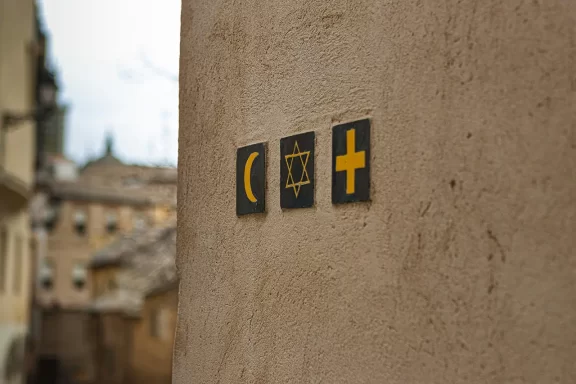Ascension Day, observed by Christians around the world, marks a pivotal event in the religious calendar—the ascension of Jesus Christ into heaven after his resurrection. It’s a day filled with symbolism, reflection, and significance, not just for Christians but also for various religious traditions worldwide. In this blog post, we’ll delve into the multifaceted significance of Ascension Day, exploring its meaning and relevance across different faiths.
The Christian Perspective
For Christians, Ascension Day commemorates the final earthly appearance of Jesus after his resurrection and his ascent into heaven. According to Christian belief, Jesus spent 40 days appearing to his disciples. He taught them, and prepared them for their mission to spread the Gospel to the ends of the earth. The ascension represents Jesus’ return to his heavenly Father, marking the completion of his earthly ministry.
The ascension holds profound theological significance for Christians. It signifies Jesus’ exaltation and reign at the right hand of God, as well as the promise of his return. It also serves as a reminder of the disciples’ commission to continue Jesus’ work and to await his second coming.
The Symbolism of Ascension
Ascension Day carries rich symbolism that resonates beyond the boundaries of Christianity. The act of ascending into heaven symbolises transcendence, spiritual elevation, and the journey from the earthly realm to the divine. It represents the triumph of the human spirit over earthly limitations and the eternal hope of reunion with the divine.
Moreover, the ascension underscores the interconnectedness of the material and spiritual worlds. It reminds believers of the existence of a higher reality beyond the confines of the physical realm and beckons them to aspire toward spiritual growth and enlightenment.
Ascension Day in Islam
In Islam, the ascension holds significance as well. Known as Isra and Mi’raj, it refers to the Prophet Muhammad’s miraculous night journey from Mecca to Jerusalem and his ascension to heaven. According to Islamic tradition, during this journey, Muhammad received revelations from Allah and encountered various prophets, culminating in his ascent through the heavens.
Isra and Mi’raj signify the spiritual journey of the believer and the ascent to divine proximity. It emphasises the importance of spiritual purification, obedience to God’s commandments, and the ultimate reward of paradise for the righteous.
Ascension Themes in Judaism
In Jewish mysticism, ascension themes are also present, albeit in different forms. Concepts such as Merkabah mysticism and the ascent of the soul to higher spiritual realms bear resemblance to the themes of ascension found in Christianity and Islam. The ascent of the soul represents the journey toward divine understanding and union with the divine presence.
Ascension in Hinduism and Buddhism
In Hinduism, ascension is intricately linked to the concept of Moksha, liberation from the cycle of birth and death. Through spiritual practice, self-realisation, and devotion to the divine, individuals seek to transcend the limitations of the physical realm and achieve union with the Supreme Being.
Likewise, in Buddhism, ascension represents enlightenment and liberation from suffering, leading to the attainment of Nirvana. By following the Noble Eightfold Path and cultivating mindfulness, compassion, and wisdom, practitioners strive to overcome ignorance and achieve spiritual awakening.
Ascension in Indigenous Traditions
Indigenous cultures worldwide embrace ascension themes through shamanic practices and spiritual ceremonies. These traditions emphasize the journey of the soul to higher states of consciousness and connection with the spirit world.
Shamans serve as intermediaries between the physical and spiritual realms, guiding individuals on transformative journeys of healing, revelation, and empowerment. Through rituals, drumming, chanting, and trance-induced states, participants seek spiritual renewal, communion with ancestral spirits, and the restoration of balance and harmony in the natural world.
Ascension in New Age Spirituality
In contemporary spiritual movements, ascension takes on new meanings, often associated with personal growth, transformation, and the awakening of consciousness. It reflects the human quest for higher truths and expanded awareness.
New Age practitioners explore diverse spiritual practices and metaphysical teachings, ranging from energy healing and chakra balancing to angelic communication and past-life regression. These modalities offer pathways to self-discovery, inner peace, and spiritual evolution, empowering individuals to unlock their full potential and embody their highest selves.
The Practice of Ascension in Modern Society
In today’s world, individuals seek ascension through various practices such as meditation, yoga, and mindfulness. These practices facilitate inner peace, spiritual growth, and alignment with higher consciousness.
Mindfulness meditation, in particular, has gained widespread popularity for its ability to cultivate present-moment awareness, reduce stress, and promote emotional well-being. By quieting the mind and tuning into the body’s wisdom, practitioners access deeper levels of insight, clarity, and spiritual connection.
Universal Themes of Ascension
Beyond specific religious traditions, Ascension Day resonates with universal themes that transcend cultural and religious boundaries. It speaks to the human longing for transcendence, the quest for spiritual enlightenment, and the belief in a higher purpose beyond the mundane aspects of existence.
Ascension Day serves as a reminder of the interconnectedness of humanity and the divine, regardless of individual faith traditions. It invites people of all backgrounds to contemplate their spiritual journey, strive for inner transformation, and cultivate a deeper connection with the sacred.
Conclusion
In conclusion, Ascension Day holds profound significance across various religious traditions, symbolising themes of transcendence, spiritual elevation, and divine proximity. Whether commemorated as the ascension of Jesus Christ in Christianity, Isra and Mi’raj in Islam, or through mystical traditions in Judaism, the essence of ascension resonates universally.
As we observe Ascension Day, let us reflect on the timeless wisdom and spiritual insights it offers. Let us transcend the differences and unite humanity in our shared quest for spiritual fulfilment and divine communion. May the spirit of ascension inspire us to ascend above the challenges of life, reach for higher truths, and journey toward the eternal light of the divine.
With each Ascension Day, we renew our commitment to spiritual growth, embracing the transformative power of faith and the boundless possibilities of the human spirit.
Feel free to share your reflections and experiences on Ascension Day in the comments below. Let us celebrate the journey of the soul and the eternal quest for the divine.








No Comments